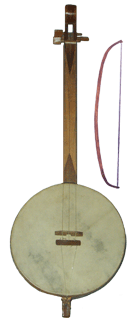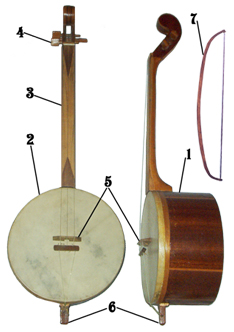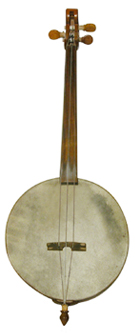:: Chuniri

Chuniri
Chuniri is an ancient Georgian string instrument played by a fiddlestick. It is a kind of lute that only the mountain inhabitants of Georgia preserved this instrument in its original form. This instrument is considered the national instrument of Svaneti (North Georgia in the Caucasus) and is thought to have spread from there to other regions of Georgia. Chuniri has different names in different regions: in Khevsureti, Tusheti (Nort-East mountainous Georgia) its name is Chuniri, and in Racha, Guria (West Georgia) - “Chianuri”. Chuniri is used for accompaniment. It is often played in an ensemble with Changi and Salamuri. One-voice songs, national heroical poems and dance melodies were performed on it. Chuniri and Changi are often played together in an ensemble when performing polyphonic songs. More than one Chunuri at a time is not used. Chuniri usually played by men, as well as women.
The instrument consists of oval body (1), neck (3) and subsidiaries (tuning pegs, bridge and legs). The sound is reproduced with a fiddlestick. The body (1) of the Svanetian Chuniri has the shape of a oval sieve and covered with leather (2), fastened to its back by a rope. The lower part of the body is open, and the neck (3), which is solid and flat, is attached inside the body. On the head there are three holes for tuning pegs. The subsidiaries are tuners (4), a bridge (5) and a leg (6). On one end of the neck, horsehair (nylon) strings are fastened. The fiddlestick (7) has notches for strings. The instrument’s side strings i.e. first and third strings are tuned in quart, but the middle (second) string is tuned in tercet with other strings.

Chuniri
A Rachian Chianuri, on the other hand, has a boat-like body, cut out of a whole piece of wood. It has 2 holes of 5-6 mm in diameter, the prop attached to the edge of the hollow body along the neck. The chuniri is played with a bow that has notches for strings.
Khevsuretian and Tushetian Chuniris have round bodies. The musician plays the instrument by touching the strings with the finger pads, avoiding any contact with the the neck; this touch lends it a flageolot sound. The fiddlestick touches all strings simultaneously, creating a three-part or two-part consonance depending on the number of strings. So the Chuniri has only three-part consonance.
The body of Chuniri is made of fir or pine-tree and the neck is made of birch or oak. The strings are made from horsehair (today mostly used nylon strings). This sort of string gives the instrument very soft and pleasing sounding. Depending on the region, there are two or three strings: the Rachian Chianuri has 2 strings. Its tune is major third, tuned to a major third and the 3-stringed Svanetian and Tushetian chuniri is tuned to a second-third. Chuniri can have two or three strings made of horsehair. Its fiddlestick also has horsehair.
Tuning of the three-stringed chuniri: as – b – des1.
Tuning of the two-stringed chunuri: as - c1.

Chuniri
Chuniri is kept in a warm place. Often, especially in rainy days it was warmed near fireplace before playing, in order to emit more harmonious sounds. That is done in order to protect the leather and wood from the adverse affects of humidity and cold drafts. In Svaneti and Racha people even could make a weather forecast according to the sound produced by Chuniri. Weak and unclear sounds were the signs of a rainy weather. Given the effects of humidity on wood and leather, it is easy to imagine a weather-related change in relative pitch. This fact is well-known in all regions where the fiddlestick instruments were spread.
Traditional people believed that the chuniri had magical powers. For example, in Svaneti when a person was lost in an avalanche, the search party took along a chuniri and a rooster. They played the chuniri while searching and when the rooster crowed, they would start digging out the snow there and then.
One of the most common and important was the commemoration of the dead. It was a tradition to play Chuniri late at night on the eve of a funeral, one of the relatives (man) of the dead person would sit down in open air beside a bonfire and play a sad, low-pitched melody. In his song (sang in a low voice) he would remember the life of the dead person and the other dead ancestors of the family.
Most songs performed on this instrument are connected with sad occasions, giving rise to the expression in Svaneti, “Chianuri is for sorrow.” However, it is often played at weddings, too.
Go to top


